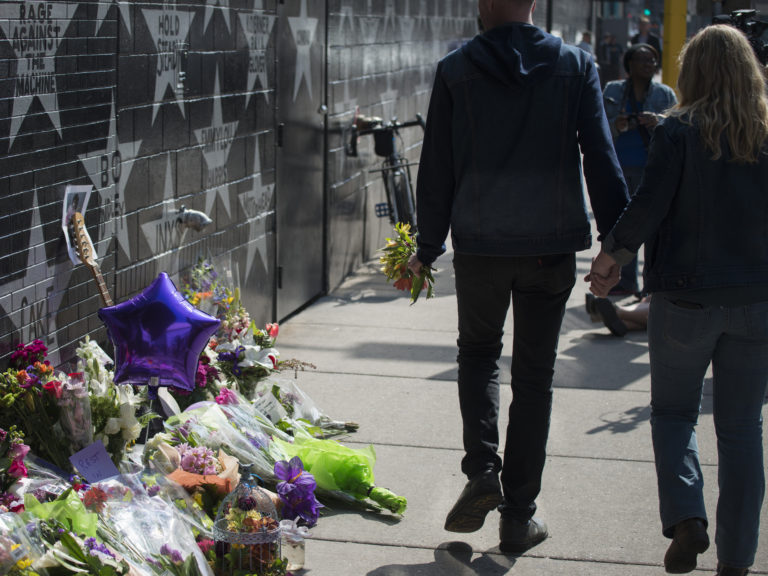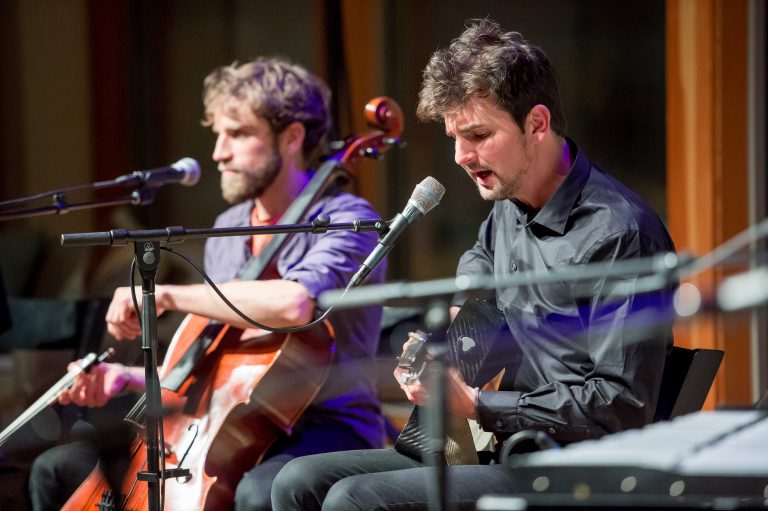
Image by Fibonacci Blue/Flickr, Attribution.
To Be Yourself Completely: The Collective Grief of Losing Prince
Like many people around the world — and if my Facebook feed is any indicator, like nine out of ten Minnesotans — I have been obsessively reading about Prince, listening to Prince, watching video clips of Prince, and mourning his death for the past week.
Each time I see him online — playing, dancing, strutting, singing — I am always on the verge of weeping. Yes, from sadness, but also from the sheer energetic force of seeing someone doing the very thing he was created to do.
I have watched my city openly, collectively grieve. “He was ours,” I hear over and over again.
And here’s the weird, almost embarrassing truth: I had very little connection to Prince. I was not allowed to own his music as a teenager in the ‘80s and ‘90s — it was far too risqué — so I did not grow up immersed in his songs or his celebrity. I came to appreciate his music much later, in my early 30s, after we moved to Minneapolis. I never saw him perform. I only spoke with him once, when I worked in a bookstore near Lake Calhoun, and he stopped in and asked me a question about coffee.
So why the choking melancholy, this sense of being suddenly unmoored? Have we all just lost our collective minds?

Inevitably, someone on the Internet will helpfully point out that grieving a celebrity is shallow and delusional. It’s not like you knew him. Get a life. But this criticism, like most, misses the point. It homogenizes all grief to equal the sadness you feel only when the person who died is someone you knew and loved intimately. If you know grief at all, you know it does not play by those kinds of stilted, neat rules. No sir.
It often shows up as a messenger to let us know what we are missing, what we long for, what we wait for and have dared to hope for. If you have walked with grief, you know: you can mourn a lifetime of memories that never even happened.
This, I think, is the strange, sacred space of collective grieving. Even though most of us who are lamenting Prince’s death had no tangible connection to him as a person, we are sharing a collective knowing, and it is a heavy, holy thing to bear. Certainly it does not compare to what his close friends and family are experiencing, and nobody is claiming that — but it is no less real, and no less worth listening to. So I’m wondering, what is our collective grief telling us and asking us to be awake for?
We know he had decades of music left in him, a million ideas zinging in that uncontainable creative rush that lived in and through him. In a Tweet heard ‘round the world, we felt it:
We grieve the loss of the otherworldly companionship and revelation that can be found in music, the songs we will never hear and he will never write.
We know that he loved Minneapolis, that he chose this place. It is a marvelous thing to feel chosen, isn’t it? That is a theme that populates so much of his music, and all music — to feel special, remarkable, memorable. We were lovely to him. He picked us out of a crowd of beautiful ones. It is hard to let that go.
Here is something I think we don’t fully appreciate about collective sadness: that grief, however and whenever it shows up, is the constant reminder of the unfilled spaces that still live in us — and that reminder holds immense transformative potential for us. It brings into our awareness again, for brief moments at at time, what we all know we could be, if we dared. It is a transcendent thing to recognize and claim that truth. In allowing ourselves to grieve together, whatever the cause, our shared broken-heartedness becomes the wisest, most insistent teacher.

We know — in our bones we know it — that when we have heard or watched Prince perform, we have seen a person, since he was a child, who was uncompromisingly himself. We cannot underestimate how powerful it is to bear witness to this, because it is so rare. And, yes, we sorrow for the fact that he is no longer here to be that.
But, even deeper down, we sorrow for ourselves and all the ways we are compromising who we are each day: the jobs and relationships that are killing our spirits, the bitterness we refuse to let go of, the small ways we diminish and silence our God-given gifts for the sake of safety and approval.
Prince had a choice when music came to him. He could just as easily have done something else. At some point, we simply stand in awe of how one human can affect so many. And here, collective grief channels Mary Oliver and lays this question gently at our feet:
“Tell me, what is it you plan to do with your one wild and precious life?”
It’s too easy to say, But I can never be Prince! And that is true, of course — but that is not a tragedy. Is it tragic that he wasn’t David Bowie or the Dalai Lama? Of course not. The very thought is absurd. We understand that the only real tragedy is if he never would have been himself. And the same is true, believe it or not, for the rest of us.
What are we giving up — and what is the world missing out on — when we don’t follow the pull of our own inimitable virtuosities?
When you give yourself over to whatever genius lives in you, you become a light. Coach and author Caroline McHugh describes this phenomenon in her TED Talk on the art of being yourself, and her lilting Scottish accent creates a kind of prose poem as she goes:
“These are individuals who managed to figure out the unique gift that the universe gave them when they incarnated, and they put that in the service of their goals…
And when we see these people, we invariably call them larger than life. Life is large, but most of us don’t take up nearly the space the universe intended for us. We take up this wee space ‘round our toes, which is why when you see somebody in the full flow of their humanity, it’s remarkable. They’re at least a foot bigger in every direction than normal human beings, and they shine, they gleam, they glow. It’s like they swallowed the moon.”
And Prince had that glow, didn’t he? His gift, the moment he took it into his arms, was large enough to trail moon magic with him. Do you sometimes ache for that knowing and courage, and the fullness of that kind of light? I do.
Like all grief, collective grief is a powerful force for transformation, if we let it be. What are you longing for? Are you willing to see it, to take it in, to surrender to it, to love it the way you love the gifts of others? Sure, it probably won’t manifest in glittering stage lights and selling millions of albums — but that isn’t the goal of living uncompromisingly as yourself. All of that only came to Prince when he put his hands on a piano or a guitar for the first time and decided he would never leave, no matter what. His reward was getting to live his days fully alive as a conduit for the electricity of music. You are meant to be a conduit, too, for whatever is meant to flow through you.
We can mourn what we lost in this incredible artist, but we are not lamenting who he could have been, because he was exactly who he was supposed to be. A huge part of his legacy is also an unmistakable call to us who mourn together. We don’t have to grieve what is unfinished in us, either. What is there, in each of us now, alive, asking that we pay attention, waiting for us to say yes?


Share your reflection